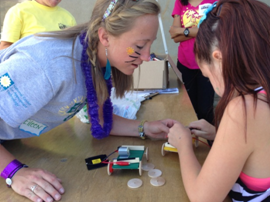“What do you want to get out of this experience?” I still remember the question from my initial Energy Corps interview. It was a good question. At the time I was about to graduate from college, I had no plan for the next year, and more generally, I was not sure what I wanted to do with my life after graduation. I thought for a moment then responded, “I want to learn as much as I can and get a better idea of what I want to do with my life after college.” Entering into my fourth month of service, I can say I got my wish. I have no reservations about saying that I have learned more over the past three months than I have at any other point in my life.
My Energy Corps education began almost immediately as a week after my graduation from Hamilton College. I boarded a plane and flew to Butte, Montana for my pre-service orientation. After a hectic week of being introduced to electrical engineering, passive solar design, geothermal power, community organizing and touring the Sage Mountain Center in Whitehall Montana, I flew to Philadelphia, a city I had never been to, to work for the Energy Coordinating Agency (ECA) of Philadelphia.

Upon arriving at the ECA, I was informed that I would be splitting my time between two departments, Energy Conservation and Green Jobs Training. This news announced an acceleration of my education as I needed to quickly learn the inner workings of two departments whose tasks were relatively unrelated. I jumped at the opportunity and quickly found myself learning the finer points of heat transfer, air sealing, insulation installation, and customer relations while working to improve the energy efficiency of low income housing through the ECA’s Conservation Department.
Through the Conservation Department, I also learned about water conservation and storm water management. While improving energy efficiency in low income homes, coworkers and I installed low flow shower and faucet heads across Philadelphia. Additionally, I assisted in the construction and installation of rain barrels and flow through planter boxes to help manage storm water. Rain barrels and flow through planter boxes are green technologies that are attached to homes’ downspouts. These devices capture and store up to 50 gallons of rainwater, which helps alleviate the pressure that rainfalls place on the sewage system.

In addition to the technical skills I gained while working for the Conservation Department, I am learning more office based lessons through the Training Department. While serving in Training, I have learned about marketing green classes, community outreach, creating the curriculum for adult classes and hosting educational seminars. Additionally, I have learned the critical importance of clear interoffice communication, organization, proper document management and foresight.
While I have already learned so much through my Energy Corps experience, I do not expect my education to slow down. Last week I was informed that I will be integrated into a third department in the ECA, Smart Energy Solutions(SES). Through SES, I will learn how to measure the energy use of industrial/commercial buildings and project the benefits of potential energy saving measures. I am excited for the lessons I will continue to learn at the ECA and although I am still unsure exactly what I want to do with my life after college, I am thrilled to begin the next chapter of this true learning experience.
 Bill Pedersen, a native of Wellesley, Massachusetts, Bill attended Hamilton College in Clinton, New York graduating in May 2013. As an undergraduate Bill majored in Environmental Studies with a focus in American Studies, and minored in History. Bill has previous internship experiences with the Appalachian Mountain Club and a Boston based solar development company. Outside of work, Bill is an avid outdoors man who enjoys hiking, fishing, biking, and boating. Bill is serving as an energy auditing intern with the Energy Coordinating Agency of Philadelphia, Pennsylvania. Bill is very excited about serving with the Energy Corps and making a difference in Philadelphia communities.
Bill Pedersen, a native of Wellesley, Massachusetts, Bill attended Hamilton College in Clinton, New York graduating in May 2013. As an undergraduate Bill majored in Environmental Studies with a focus in American Studies, and minored in History. Bill has previous internship experiences with the Appalachian Mountain Club and a Boston based solar development company. Outside of work, Bill is an avid outdoors man who enjoys hiking, fishing, biking, and boating. Bill is serving as an energy auditing intern with the Energy Coordinating Agency of Philadelphia, Pennsylvania. Bill is very excited about serving with the Energy Corps and making a difference in Philadelphia communities.








